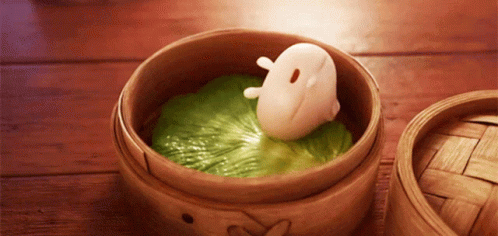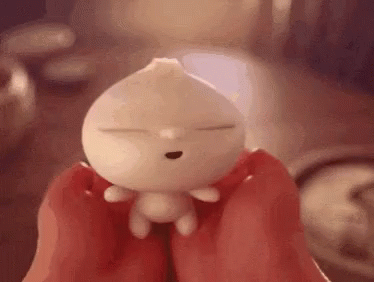A Year in Shorts Day 311: "Bao"
It’s been a pretty interesting week, hasn’t it? We’ve looked at all sorts of shorts, from surreal German films, wacky comedies from the Golden Age of animation, to beautiful explorations of time and memory. We even watched a live action film! Still, a discussion of my favorite shorts wouldn’t be quite complete without looking at a Pixar film, would it? And so we end my birthweek celebration with the hilarious and heartwarming short, Bao.
Written and directed by Domee Shi, Bao is a 2018 short released in theaters before Incredibles 2. Yes folks, today's short is another entry in the long, proud series of Pixar shorts which are significantly better than the features they play before. (Apologies to all five Incredibles 2 fans out there.) The story of a Chinese Canadian woman suddenly finding herself raising a sentient steamed bun (it makes more sense in context), Bao is a pretty important film for Pixar in a couple of ways. For starters, Bao is the first short in Pixar's history to be directed by a woman. (The fact that Bao is also Pixar's thirty-fifth short shows how sad it is that it took that long!) Bao, along with shorts like Sanjay's Super Team and features like Coco and Soul, is also part of Pixar's push for more diversity in the stories it tells, with Shi specifically setting out to create a short which reflected the Chinese Canadian experience. Finally (and most sadly), Bao is also to date the final Pixar short to be released in theaters, with most of Pixar's short work being done through the Spark Shorts program. For those of us who consider the Pixar short a vital part of the Pixar theatrical experience, that's pretty unfortunate. Of course, considering that Disney seems content with releasing Pixar films on Disney +, I guess there's bigger issues at stake there. None of which has much to do with the film we're discussing today.
While Bao received widespread critical acclaim (to say nothing of a well-deserved Oscar win), it is not a short without its detractors. The most common criticism leveled against it is that it's too weird. And look, yes, the short is, objectively pretty weird. Watching a woman raise a sentient bun from birth to young adulthood, all seemingly in the space of a few days, is not something you see every day. But who cares? We also don't see paper airplanes help people find love, four-year-olds join the army or penguins rob art museums either. That's one of the great things about animation, isn't it? It can take these strange concepts and bring them to life beautifully. Who needs reality in their movies, anyway? That's what real life is for! And aside from all that, Bao isn't really that strange, once you move past the initial concept. This isn't Hausu for God's sake. Once you accept what the film is laying down for you, you have a relatively straightforward story about parenthood, cultural differences, food and the importance of letting go. Hell, in the end it turns out most of the film wasn't even literally happening, so what's the big deal?
Besides, Bao is a weird movie that embraces how weird it is, and it does so with a healthy dose of humor. As the film is told entirely without dialogue (a decision Shi made to allow the film to cross cultural barriers, although it should be noted that most Pixar shorts don't have dialogue), the film has to rely mostly on sight gags to fulfill the laugh quota. And luckily for us, the sight gags in this film are pretty much all hilarious. The film contains a healthy dose of fun slapstick and absurd imagery, and the character animation does a splendid job of selling it perfectly. Shi started her career at Pixar as a storyboard artist, so it's really not surprising that she has a strong grasp on the visuals. Especially funny is the character animation on the little bao during his rebellious teenage years (days?), as he grows an asshole beard and gives his mom a legendary amount of sass. And perhaps most important of all is the moment which comes near the end of the short in which- and I cannot stress this enough- the main character straight up eats her son, which is simultaneously hilarious and depressing as hell. (Apparently Shi was pretty reluctant to pitch this ending, as she thought it'd be too dark for Pixar, but was encouraged by Pete Docter to stay true to her vision.
But more important to Bao's success than its humor is its heart. When the meaning of the film becomes clear, it's hard not to get a little emotional. (It certainly doesn't hurt that your heartstrings have already been thoroughly tugged by the cuteness of the baby bao.) And while the film has a universal appeal which makes it easy to fall in love with, it also has a cultural specificity which makes it resonate even further. Yes, Bao is a film about a mom growing apart from her son and the two of them eventually reconnecting. But it's about more than that too. It's the story of a woman holding on too tightly, a clash between the pull of two cultures, and how those cultures can bring people together. And sure, there are a lot of cultural cues that I might not get. But that authentic touch is deeply felt, and it only serves to give the film greater meaning than if it had been watered down. A story doesn't have to be universal to have wide appeal; often times I've found that the opposite proves true. The more personal and specific a film feels, the more deeply it can connect with an audience. A great deal of Bao is drawn from Shi's relationship with her own mother, and the film benefits from that personal touch.
The 91st Academy Awards famously (and deservedly) got a lot of shit for some of their wins. And yet outside the major categories like Best Picture or Actor, there was a lot of cool stuff happening, especially for women and people of color. The Oscars for Costume Design, Production Design, and Animated Feature were awarded to Black filmmakers for the first time, and all the winners in the shorts categories were directed or produced by women. And Domee Shi became the first woman of Asian descent (and second Asian artist overall) to win the Academy Award for Best Animated Short. It was a well-deserved win in a fairly competitive year for the category, and one that hopefully kicks off a long and fruitful career for the director. Shi will be making her feature debut with next year's Turning Red, another film from Pixar. I, for one, can not wait to see it, and hope that Shi brings the same level of warmth, wit and visual inventiveness that brought Bao so beautifully to life.
Keep up with the Oscar Baiting here on Letterboxd!
"Bao" is available to watch on Disney +
The Great Oscar Baiter is a not-for-profit work of criticism. All images herein are property of their respective owners and are protected under Fair Use.





Comments
Post a Comment